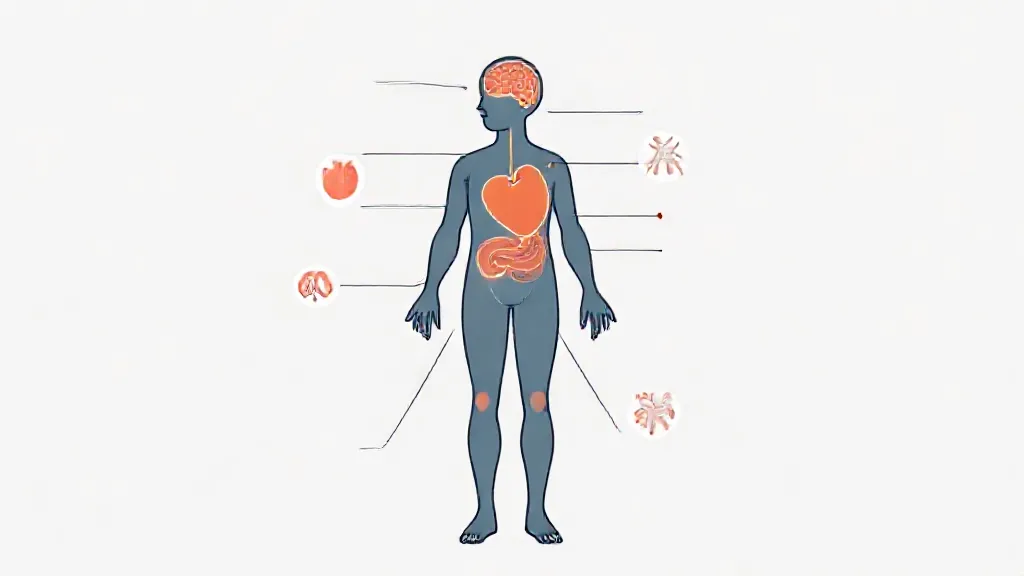Anxiety is a complex emotional response that can significantly impact various aspects of an individual's health. While it is often perceived as a psychological issue, anxiety manifests physically in numerous ways, affecting different systems within the body. Understanding where anxiety affects the body most can help individuals recognize symptoms and seek appropriate interventions.
The Brain: The Epicenter of Anxiety
Anxiety begins in the brain, particularly in the amygdala, which plays a crucial role in processing emotions. When faced with a perceived threat, the amygdala sends signals that trigger the body's fight-or-flight response. This reaction leads to the release of stress hormones such as cortisol and adrenaline, which prepare the body for immediate action.
Prolonged activation of this response can lead to chronic anxiety, contributing to cognitive impairments, memory issues, and emotional dysregulation.
The Cardiovascular System: Heart Under Pressure
The cardiovascular system is significantly affected by anxiety. Individuals experiencing anxiety often report increased heart rates, palpitations, and elevated blood pressure.
Chronic anxiety can lead to long-term cardiovascular issues, such as hypertension and an increased risk of heart disease. Research indicates that the stress response can cause inflammation in the arteries, further exacerbating these risks. Managing anxiety through lifestyle changes or therapeutic interventions can help mitigate these cardiovascular effects.
The Gastrointestinal Tract: The Gut-Brain Connection
The relationship between anxiety and gastrointestinal health is well-documented. Anxiety can lead to various digestive issues, including irritable bowel syndrome (IBS), nausea, and changes in appetite. The gut is often referred to as the "second brain" due to the vast network of neurons it contains and its connection to emotional health.
Stress and anxiety can disrupt the balance of gut microbiota, leading to further complications. Understanding this connection can aid in developing effective treatment plans that address both mental and digestive health.
Musculoskeletal System: Tension and Pain
Anxiety can cause muscle tension, leading to discomfort and pain in various body parts.
Common areas affected include the neck, shoulders, and back. This tension can result in chronic pain conditions, such as tension headaches or fibromyalgia. Additionally, individuals may adopt poor posture or engage in repetitive movements due to anxiety, exacerbating musculoskeletal issues.
Recognizing the physical manifestations of anxiety can encourage individuals to seek therapeutic modalities such as physical therapy or massage.
Respiratory System: Breathing Difficulties
Anxiety can lead to respiratory issues, including shortness of breath, hyperventilation, and a feeling of tightness in the chest. These symptoms can create a cycle of increased anxiety, as individuals may fear the sensation of not being able to breathe properly.
Chronic anxiety can also exacerbate existing respiratory conditions, such as asthma. Breathing exercises and mindfulness practices can be effective in managing anxiety-related respiratory symptoms.
Immune System: Vulnerability to Illness
Chronic anxiety can compromise the immune system, making individuals more susceptible to infections and illnesses.
Stress hormones can inhibit the production of immune cells, reducing the body's ability to fight off pathogens. This connection highlights the importance of managing anxiety not only for mental well-being but also for maintaining physical health. Engaging in stress-reducing activities, such as yoga or meditation, can bolster immune function.
Skin: The Visible Signs of Stress
The skin can also reflect the effects of anxiety. Conditions like eczema, psoriasis, and acne can worsen with increased stress levels. The release of stress hormones can trigger inflammatory responses in the skin, leading to flare-ups.
Furthermore, anxiety can lead to habitual behaviors such as skin picking or nail biting, which can damage the skin and exacerbate existing conditions. Addressing anxiety through therapy and skincare can improve both mental and physical appearance.
Conclusion: The Importance of Holistic Approaches
Understanding where anxiety affects the body most emphasizes the need for a holistic approach to treatment.
Addressing anxiety through psychological therapies, lifestyle modifications, and physical health interventions can lead to improved overall well-being. Individuals experiencing anxiety should be encouraged to seek comprehensive care that considers both their mental and physical health needs, paving the way for a healthier, more balanced life.
